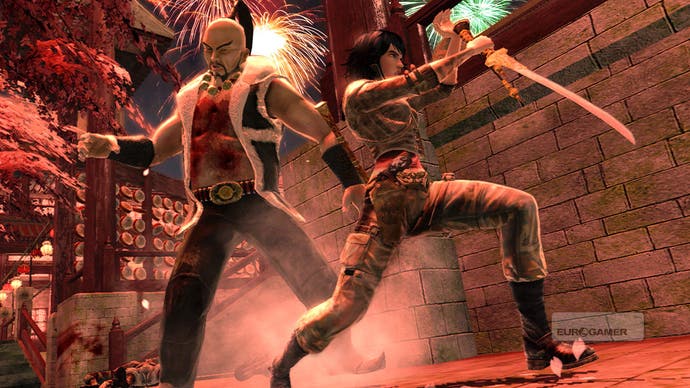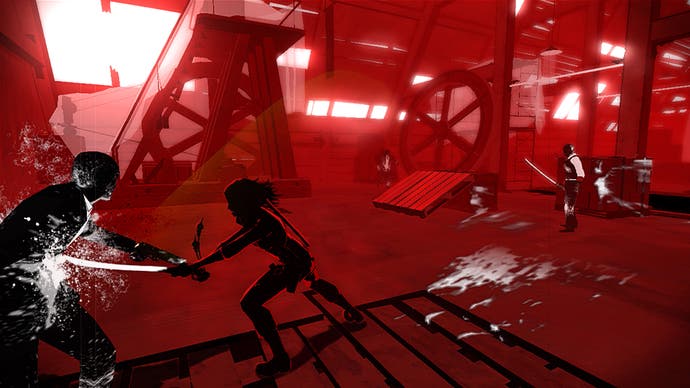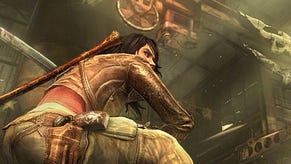The Double-A Team: In bullet ballet Wet, grindhouse got a glow up
Great gonzo.
The Double-A Team is a newish feature series honouring the unpretentious, mid-budget, gimmicky commercial action games that no-one seems to make any more. Check out our archive of Double-A pieces here!
What does Quentin Tarantino truly love? Bare feet, sure, but let's not get into that. His other big obsession is 1970s grindhouse cinema, that vast reservoir of zero-budget C-movies that all seem to promise violence, gore or some sort of corrupting wickedness. The best of these slapdash quickies thrum with a disreputable energy. Most are charmless and unwatchable. The trailers - lurid, voiceover-heavy and mercifully short - are usually the best part.
In 2007, Tarantino and his buddy Robert Rodriguez channelled the ghost of drive-ins past for Grindhouse, an uncouth double-bill of throwback movies. This was a lovingly-crafted three-hour exultation of trash that somehow cost $70million to make. It absolutely belly-flopped at the US box office. Perhaps it was all just too much for the squares to take.
But Grindhouse seemed to single-handedly revive the grubby aesthetic in an unprecedented way. Suddenly a new generation of film-makers, advertising executives and game designers all wanted to invoke the exploitation movie era, and no wonder. Not only was it retro, which was cool, it also offered a short-cut to justifiable sensationalism. Even better, the distinguishing cheapo style was, essentially, a licence to half-ass things.

By the time Wet sprang into view in 2009 - and lithe, leather-jacketed assassin Rubi Malone is ideally always in motion - the whole grindhouse thing had ground all of us down. Perhaps that explains the lukewarm reception to this supremely cocky shoot-em-up, a more flamboyant heir to Max Payne's teeth-gritted gunplay tumbles. Framed as a suitably gonzo revenge movie, it is the story of a dodgy job gone wrong, and the hundreds of henchmen who apparently have to die as a result.
In Wet's world, movement begets mayhem. A flying dive cranks everything into slo-mo, allowing Rubi to impossibly corkscrew through the air while acquiring and shooting multiple targets. From her triumphant goalscorer's knee slide you can draw a bead on mid-range lackeys or slash at the ankles of nearby cannon fodder with a katana. You can even somehow land bloody headshots in the snatched moments between trapeze jumps.
This kind of ultra-violent bullet ballet had been done before but Wet goes the extra style mile. When confronted by a metal ladder leading to a lower level, Rubi promptly slides down it using her knees as grip, taking potshots from an inverted position. Never mind the fact that her sturdy combat boots weirdly sound like clacking high heels, just enjoy her large repertoire of kill-quotes, delivered with arched-eyebrow swagger by Eliza Dushku. (Among the triumphant cries of "Bingo!" and "See ya!" my particular withering favourite: "You should have called in sick.")

The globe-trotting, double-crossing plot breaks up the relentless shooting with car chases, skydiving, the odd quick-time duel and some slightly dull training levels. There are also occasional freakout sequences that swap the scratched-up celluloid for a flattened-out world of abstract blacks, seething whites and vivid reds: part Killer 7, part Superhot. But despite these solidly-executed variations on a lethal theme, there is still the nagging sense that - like fellow Double-A hall-of-famer Stranglehold - you have seen pretty much everything Wet has to offer in its first reel.
What remains admirable even a decade on, though, is the level of craft and commitment Wet lavished on its grindhouse gimmick. Authentic vintage ads are inserted to mask loading times. The custom-recorded soundtrack twangs with surf guitar riffs and puckering rockabilly reverb. Dip low on health and the whole screen starts to jolt, the sprocket holes of the film abruptly encroaching the screen. Wet was selling you a vision of down-and-dirty but polishing it up to a shine. So it's shame it spluttered on release - but that perceived failure would probably make Tarantino appreciate it even more.



